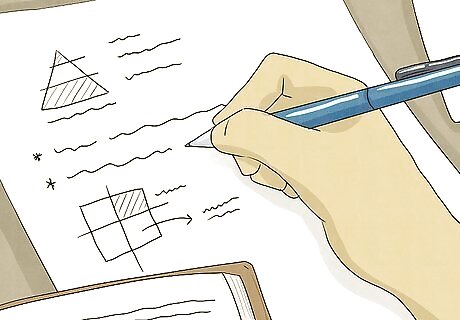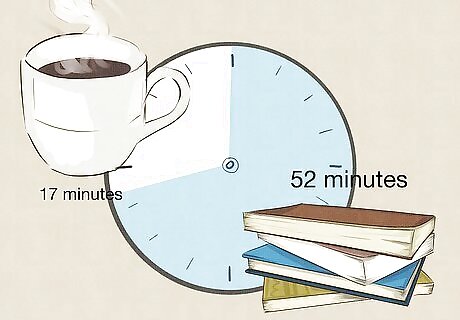
views
Suggest a good possible time to study.

Think about when your girlfriend is most active. Is she typically up at the crack of dawn, or is she more of a night owl? Suggest a time when she’s at her most productive, and see if she’d prefer to study then. You might suggest a late-night study session if your girlfriend doesn’t go to bed until 2:00 AM. She may want to study at a different time than you suggest. That’s totally fine, too!
Cater to her learning style.

Some people learn and study better with different activities. Does your girlfriend like to read and process new information visually, or does she prefer to listen to the information? Or, does she learn best with hands-on activities? Ask her if she studies better with specific activities and habits—depending on what she says, you might suggest specific, helpful activities she can try while studying. If she’s a visual learner, you might suggest that she draw diagrams or color-code notes for her calculus class. You could offer to read her literature notes aloud if she’s more of an auditory learner. You might prepare for a public speaking class with a role-playing activity, or build models to help study for a physics exam.
Quiz her with questions from a practice exam.

Practice tests are an easy way to go over material for a test. Ask your girlfriend if she’d find a practice exam helpful—if she does, offer to ask her questions from a practice exam. Sitting and filling out a practice test can be a lot more tedious. You can find free practice exams online, depending on the subject.
Offer to make some flashcards.

Flashcards are a great way to recall different words and terms. If your girlfriend doesn’t already have some, ask if she’d like you to write out any important terms or definitions on flashcards that she can review later. It’s okay if she doesn’t need your help—just let her study in a way that’s best for her. Don’t write too much on each card—just a word or definition on each side is enough. To keep things organized, write a question on 1 side and an answer on the other. For an anatomy class, you might write flashcards that label different parts of the body. In a French class, you might define specific vocabulary words.
Come up with some creative mnemonics.

Mnemonics are creative ways to commit information to memory. Ask your girlfriend if she’d like to use mnemonics while studying. If she agrees, think of some different possible mnemonics for what your girlfriend is studying for—chances are, she might like the suggestion! My Very Excellent mother Just Served Us Nachos is a common mnemonic used to memorize the planets in the solar system. Rhyming sentences or short poems are other great ways to memorize information. PEMDAS (parentheses, exponents, multiply, divide, addition, subtraction) is an example of a popular math mnemonic.
Invite her to teach you the material.

You’re more likely to recall information if you put it in action. A short lesson is a great way to do this! Ask your girlfriend if she’d like to teach you about whatever she’s studying, whether it’s history, math, a foreign language, chemistry, or something else altogether. Some studies show that you’ll remember 90% of what you’ve learned when you teach it to someone else. Your girlfriend might teach you how to conjugate Spanish verbs in the past tense, or walk you through the dark and light stages of photosynthesis.
Find ways to make study topics personal.

It’s easier to recall information that you’re connected to in some way. Offer to brainstorm ways she might remember certain facts, concepts, or vocab better—it might be through an inside joke, or a special memory the 2 of you share. These associations might help her remember some important information during her test! For example, if she’s trying to memorize a specific historical date, you might mention a special activity the 2 of you did together on that day.
Encourage her to alternate studying with breaks.

Researchers recommend studying for 52 minutes, and taking a break for 17 minutes. Offer to set a timer for that time, or suggest that she take periodic breaks. Whenever she chooses to take a break, offer lots of support and encouragement, and try to keep her mind off her studies. The 52/17 model works best if you study nonstop for the 52 minutes, and then rest completely for the 17 minutes.
Bring over some snacks.

Healthy snacks are excellent study fuel. Ask her if you can grab some food for her study session. If she agrees, offer some almonds or trail mix as a more savory snack, or bring over some fruit salad, frozen grapes, or apple slices and peanut butter to satisfy her sweet tooth. Greek yogurt, veggies and hummus, air-popped popcorn, dark chocolate, or roasted chickpeas are also tasty, nutritious snacks to consider. Apples, strawberries, blueberries, kiwis, pineapple chunks, banana slices, and grapes are all great ingredients for a delicious fruit salad.
Offer emotional support.

Let your girlfriend know that you support and believe in her. Studies show that support from a partner can be really beneficial, and actually helps your significant other achieve their goals. You might say something like, “I’m really proud of how you’re studying for your test,” or “You’re going to be a great doctor someday.”
Follow her lead as she studies.

Obvious hints and suggestions aren’t always the way to go. Your girlfriend might want to figure things out independently, and may not want any unsolicited advice or suggestions. According to a study, some people feel more at ease studying when their significant other takes a step back. If you know about the topic she’s studying, don’t assume that she wants your expertise. Always ask before offering any unsolicited help!
Avoid being controlling.

Commandeering the situation is never a good idea. While it’s great that you want to help, controlling and manipulating her study routine will do far more harm than good. Let her decide when and how she wants to study for her test, and just follow along with whatever she decides. One study shows that controlling behavior in a relationship can often backfire, with the “controlled” partner deliberately opposing their partner’s demanding wishes. Don’t say something like “You will study for 2 hours tonight.” Instead, suggest or offer an alternative, like “Would you like to study tonight?” or “Do you need any help getting ready for the math test tomorrow?”


















Comments
0 comment